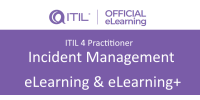Exam Glossary
| Term | Main definition |
|---|---|
| failure | A loss of ability to operate to specification, or to deliver the required output or outcome. |
| external customer | A customer who works for an organization other than the service provider. |
| event | Any change of state that has significance for the management of a service or other configuration item. |
| ethics | A system of principles that defines what is good for individuals and society. |
| escalation | The act of sharing awareness or transferring ownership of an issue or work item. |
| error control | Problem management activities used to manage known errors. |
| error | A flaw or vulnerability that may cause incidents. |
| epic | A high-level definition of a requirement that has not yet been sufficiently refined or understood. Eventually an epic will be refined or broken down into several user stories and requirements. |
| environment | A subset of the IT infrastructure that is used for a particular purpose, for example a live environment or test environment. Can also mean the external conditions that influence or affect something. |
| engagement risks | Risks that originate from an organization’s stakeholders, including its suppliers and partners, consumers, and employees. |
| engage | The value chain activity that provides a good understanding of stakeholder needs, transparency, continual engagement, and good relationships with all stakeholders. |
| employee fulfilment | The feeling that people have when their work aligns with their intrinsic motivation and provides them with a sense of purpose. |
| emotional intelligence | The ability to understand the way people feel and react, and to use this skill to make good judgements and to avoid or solve conflicts. |
| emergency change | A change that must be introduced as soon as possible. |
| efficiency | A measure of whether the right amount of resources have been used by a practice, service, or activity. |







